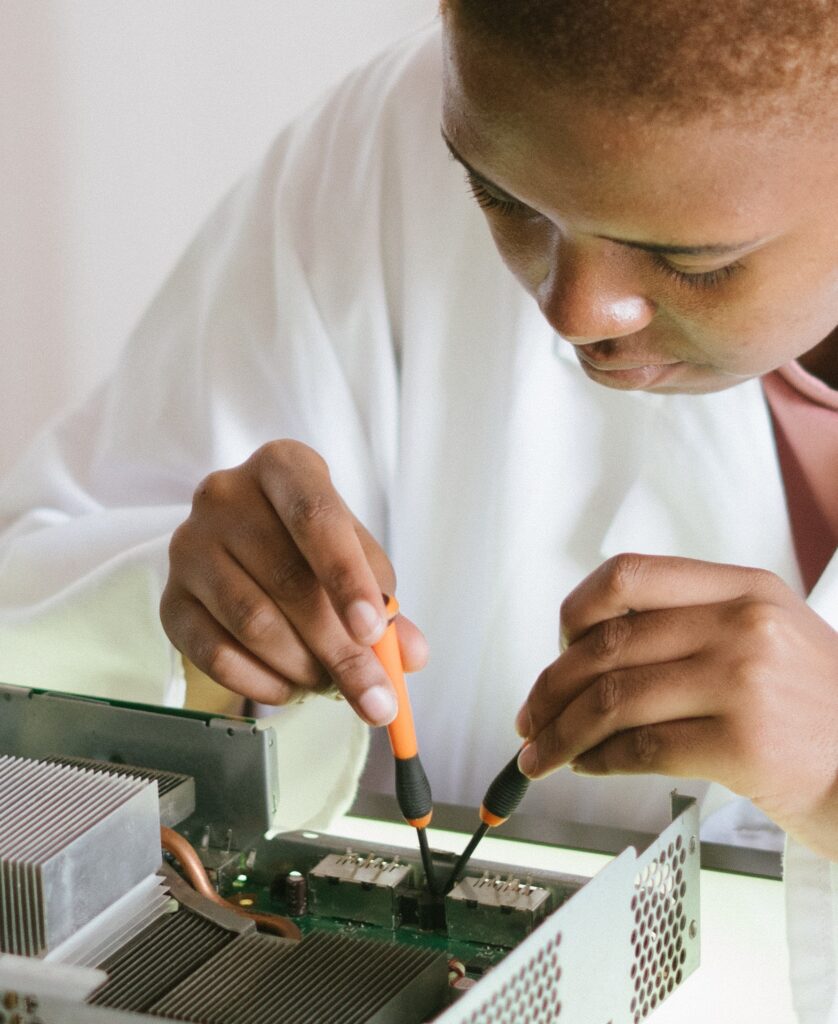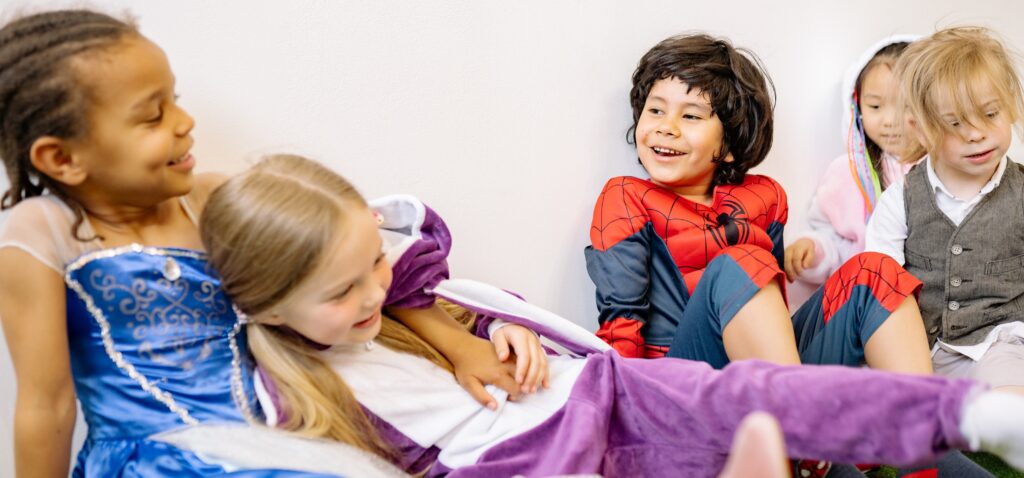Normalisation is a term used within Montessori pedagogy and practice to describe a child who is able to work consistently both independently and cooperatively without straying focus and with an inner joy and enthusiasm for the activity or ‘work’ being completed.
The characteristics of a normalised child include being able to treat others and themselves with respect and a calm and centred disposition.

To have a whole class, of thirty or more, from start to end without disruption; with every single child’s eyes, ears, hearts and minds totally besotted by a lesson and whose attitudes are composed and tranquil is a dream for many primary educators.
Yet in some environments where children younger than five are educated, this is a daily occurrence. How? Let’s explore!
There are four aspects of normalisation; love of work, concentration, self-discipline and sociability. Let’s delve into each to understand how they help bring about the attributes within a normalised child.
The Love of Work
Contrary to popular belief, children love to ‘work’. When a child (or adult) is doing something they enjoy they never tire from it, in fact, something extraordinary happens… the more you engage with what it is you enjoy, the more energy you seem to have to do more of it.

While many relate the process of doing something you enjoy as ‘play’, Piaget, Vygostsky and even Einstein noted the relationship with playing and the increasing of intelligence. Maria Montessori considered play to the be the work of the child hence why she considered the absolute undivided and seemingly never-ending attention a child gives to something that is truly engaging for him or her; that which supports the child’s physical, mental and spiritual development concurrently, the ‘love of work’.

Concentration
Ever felt that feeling when you are being watched? Even when you know you aren’t doing anything untoward; that awareness of someone else watching you doing what you do slightly shifts your level of entire focus and enjoyment of the task at hand. It’s the same with children.
“Praise, help, or even a look, may be enough to interrupt him, or destroy the activity… as concentration has begun, act as if the child does not exist.”
Maria Montessori, The Absorbent Mind, p.255
There are many reasons why moving like an invisible observer is so important in the development of a child’s concentration. As adults, we understand the importance of focusing yet children are still developing this inner ability and skill. Montessori suggests that concentration is the first vital step in laying the foundation of a child’s character and social behaviour. This is because when a child is left to focus on what they find interesting they are indirectly building self-confidence in decision-making, subconsciously establishing their intrinsic motivations and are improving their attention to detail and the ability to self correct.
In schools, educators often try to direct the will of the child and the child’s direction of concentration yet this yields the backlash of what we often mislabel as defiance. The trick is to make whatever the focus you would like to be for the child appealing to the child’s own inner yearning to grow.
To be very clear, being passively hypnotised by the bright lights and motions of something on a computer screen is not the concentration being referenced here; we speak of the concentration that enables the child to regulate his or her emotions and thoughts, like when a child is deeply focused on solving a jigsaw puzzle or pouring out a glass of juice with the intent of not spilling a drop.
The ability to intensely concentrate in order to achieve a goal, is what every teacher asks of their student. This must start however, with understanding and exploring what drives the student to focus intently.
Self- Discipline
“We call an individual disciplined when he is master of himself.” The Montessori Method, p.78
It should be apparent how the love of work and mastering concentration tie in with self-discipline. When a child is given the respect and freedom to explore their interests they are then able to curate and develop their responses and attitudes towards doing things they may not necessarily find appealing.

“The real aim of all children [is] constancy in work and spontaneity in choice of work without guidance of teachers. “
Montessori, Education for a New World, p.82
This is not to say children do not need teachers; they absolutely do. It is simply saying that their end goal is to operate independently. Isn’t that the goal teachers have for their students too? Singing from the same hymn sheet here! But how to go about achieving this without the struggle present in classrooms today? Montessori claims that to obtain discipline we must give freedom.
Instead of substituting the will of the teacher by curbing the will of the child through demanding obedience, we should aim to facilitate the child’s healthy development of their will which will no doubt include having to be obedient. If a child has the absolute urge and will to complete a computer game, for example, his or her obedience automatically kicks in. No matter how difficult it gets, the will and obedience to achieve this goal is tireless. There may even be times where wails and whelps may make an appearance yet the child overcomes their bursts of frustration and regulates their emotions and thoughts to be able to achieve what they set their mind to.
What we have in schools is the request to complete a course of study to achieve qualifications and, let’s be honest, top test scores for funding in some instances too. To understand the value of a qualification let alone the value of contributing to high tests scores so the school can stay funded is literally what we are asking of the child as early as seven.
In their heads, ‘the math ain’t mathing’; they simply do not comprehend those goals which have no immediate or concrete realisation for their growing and curious minds.
“The mind takes some time to develop interest, to be set n motion, to get warmed up into a subject, to attain a state of profitable work.”
Montessori, What You Should Know About Your Child, p.92
In order for us to facilitate that which we so desperately seek; a child who is self-disciplined, we must allow them the space and time to explore and curate their character. Any correction of behaviour which we deem necessary can and will disappear without the need of punishment or reward. Being real, open and honest about the process of schooling is what will facilitate the child’s development of self-discipline. Preparing lessons that start from the child’s perspective is what will facilitate the development of self-discipline. Understanding the reasons behind disagreeable behaviour and being very aware of child developmental phases and stages will inform you to be able to facilitate the development of self-discipline within a child.
“… if there is some lack of discipline, the cause is to be found in some lack of freedom…true obedience must elevate a child and not enslave him.”
Montessori, What You Should Know About Your Child, p.93
We want the child to be self disciplined in order to operate successfully within society as well as individually. When a child understands his or herself, they are then able to understand their place in society.

Sociability
Social skills and etiquette define how successful we are in navigating relationships with family, friends, colleagues and even complete strangers. Children should be well educated on the importance of working together with others, what it looks like and what it means for their life and those around them.
Learning social skills within the Montessori practice usually begins when engaging with practical life tasks; particularly when exploring and mastering the Grace and Courtesy activities. Saying please and thank-you, knowing how to serve guests, learning how to interrupt politely are all skills that are essential… but why? This is the question that needs examining if we are to truly support the development of children as being effective local and global citizens.
Montessori promotes the understanding of sociability and interconnectedness through the Five Great Lessons and her idea of a Cosmic Plan; that we all have our parts to play in this universe, just like the sun, the ants and the trees. Giving children concrete experiences of the knock on effects their behaviours and decisions have on themselves, each other and the world around them can be done through navigating working together at home, in class, in social settings and also through the study of the natural world around us.
“To have a vision of the cosmic plan… is to understand the child’s work and be able to guide it better.”
Montessori, The Absorbent Mind, p.135
The four aspects of normalisation are interconnected themselves; in order to sustain concentration and engage in the love of work, self-discipline and social skills such as effective communication, conflict resolution and respect all need to be experienced and mastered. Environments that are able to support this exploration will no doubt include teachers who model said tenets themselves.

When children are normalised not only do they know the ground rules, they appreciate and observe them because they realise it leads to a homogenous energy and collaborative environment. Such a classroom usually looks like students being patient with themselves and others; respectful of everything, living and inanimate; individuals who exercise self-control and self-discipline. All these qualities lead to better learning experiences. To recognise when a child has become normalised takes a trained eye and an environment that allows for this spontaneous manifestation; it takes a normalised teacher. One who can see the journey from a child doing something because they so choose to, because they are asked to and then because the know it’s the right thing to.
By approaching education in a vertically grouped, project focused manner – giving children the freedom to decide how information can be researched, learned, recorded and assessed, we give the child the respect and liberty to explore what it is teachers require them to learn.
By being honest about the purpose and discussing all the realities of the outcome of schooling in the real world (the fact that it may not necessarily secure a job for life but that it will train you to take responsibility, to have an idea of what it is you like and do not like, to shape your character by going through challenges, to understand that other people may expect things from you but what matters most is what you expect from yourself) we begin, as educators, to witness lasting conversions that impact every child’s life eternally. We take joy in observing children who are “precociously intelligent, who has learned to overcome himself and to live in peace, who prefers a disciplined task to futile idleness. When we see a child in this light, we would more properly call his ‘conversion’ a ‘normalisation’.”
Maria Montessori, The Secret of Childhood, p.148

